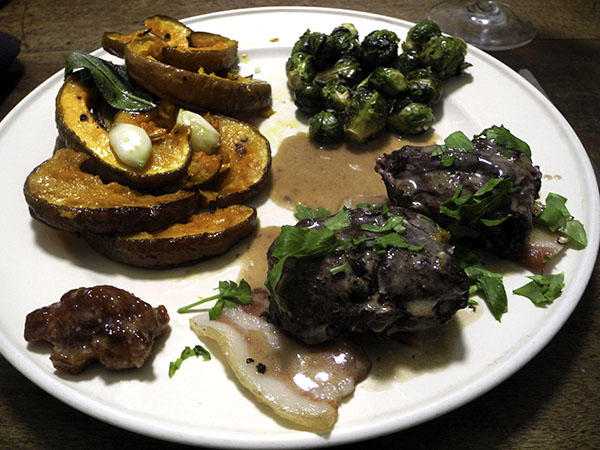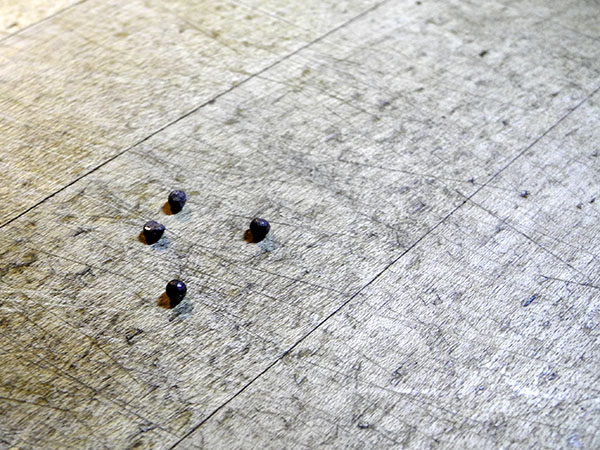
The richest, gamiest game imaginable.
Wild hare, two days in a row! Well it was already there, and for several reasons it seemed neither advisable nor possible to push back cooking our second ration of this noble meat to another day.

We found 2 more pieces of shot, for a total of 4 between us.
- a 12 ounce/325g saddle from the Scottish Mountain hare purchased from Ottomanelli’s in the West Village, on Bleecker Street just east of 7th Avenue, that we had enjoyed the night before (the back had been cut into 4 sections and already marinated, along with the other pieces cooked on Sunday, after which it was tightly wrapped and placed overnight in the refrigerator), brought to room temperature and placed, backbone side upwards, inside an enameled cast iron roasting pan just the right size for the 4 pieces, barded with 2 long rashers of streaky bacon from Millport Dairy Farm that had been parboiled for 2 minutes then rinsed in cold water, to remove some of the strong smokey flavor of the pork, each strip then cut into 4 sections in order to be more easily arranged lengthwise on top of the hare, fastened with toothpicks, the meat placed inside a pre-heated 425°F oven to sizzle for only 7 or 8 minutes, the temperature then turned down to 325°F, and the saddle cooked for only another 10 minutes or so, the meat removed and kept warm inside a small oven pan while the pan on which it had cooked was deglazed with a tablespoon of Courvoisier V.S. cognac, followed by about 8 ounces of a very rich stock (a mix of mostly a good low-sodium chicken stock with a wonderful full-flavored wine and vegetable ham stock created with this meal, and occasionally reheated to refresh it), boiled to reduce it by half, the heat turned down, the liquid allowed to cool slightly and then only about 2 ounces of heavy cream from our local Ronnybrook Farm Dairy added and stirred continuously over a flame until the sauce had thickened, the hare then arranged on warm plates on the top of the bacon slices and the sauce ladled over both, the plates finished with chopped lovage from Two Guys from Woodbridge [cook’s note: I think I would have been off adding the stock to the pan (but not over the meat itself) at the time the oven temperature was turned down, but in perhaps a smaller amount: this might have allowed the hare to cook more evenly, and also to be less well done and more moist, but I suspect all of this would have been more simple to accomplish had the animal just been larger..]
- a quince conserve from Wilkin & Sons (the quince and fig chutney I had made having been exhausted at dinner the day before)
- one 5-inch black futsu squash from Norwich Meadows Farm, scrubbed, halved vertically, the seeds and pith removed, cut into wedges just over one half-inch thick at the outside end and mixed by hand inside a large bowl with a relatively small amount of olive oil, sea salt, freshly-ground black pepper, and pieces of golden crushed dried habanada pepper, arranged on a large, unglazed, well-seasoned ceramic pan and roasted in the 425º oven on one side for 15 minutes, turned onto the other side and allowed to roast for 10 more minutes, removed from the oven and transferred to a large heavy copper pot in which 3 crushed cloves of Krasnodar red garlic from Quarton Farm and half a dozen large sage leaves from Whole Foods Market Chelsea had been gently heated in a bit of olive oil, then gently mixed in with a wooden spatula
- more small Migliorelli Farm Brussels sprouts, from the large number I had purchased more than a week earlier, washed, trimmed and dried, tossed inside a bowl with a little olive oil, salt, and black pepper, roasted inside a medium-size Pampered Chef pan until the sprouts were partly brown and crisp on the outside
- the wine was a brilliant French (Bandol/Provence) red, Domaine Castell Reynoard Bandol 2013, from Copake Wine Works (and a great pairing)
- the music was a wonderful 1964 recording of Mozart’s ‘Die Zauberflöte’, Karl Böhm directing the Berlin Philharmonic and the RIAS Chamber Choir, with Evelyn Lear, Roberta Peters, Lisa Otto, Fritz Wunderlich, Dietrich Fischer-Dieskau, Franz Crass, Hans Hotter, Hildegard Hillebrecht, Cvetka Ahlin, Sieglinde Wagner, and Friedrich Lenz, among others